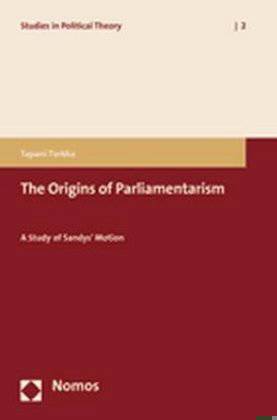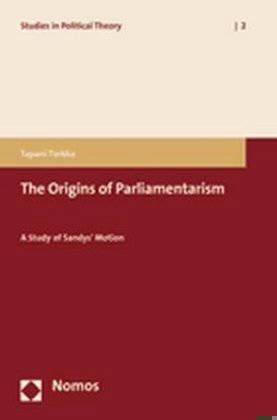
Bedankt voor het vertrouwen het afgelopen jaar! Om jou te bedanken bieden we GRATIS verzending (in België) aan op alles gedurende de hele maand januari.
- Afhalen na 1 uur in een winkel met voorraad
- In januari gratis thuislevering in België
- Ruim aanbod met 7 miljoen producten
Bedankt voor het vertrouwen het afgelopen jaar! Om jou te bedanken bieden we GRATIS verzending (in België) aan op alles gedurende de hele maand januari.
- Afhalen na 1 uur in een winkel met voorraad
- In januari gratis thuislevering in België
- Ruim aanbod met 7 miljoen producten
Zoeken
Omschrijving
In this study Tapani Turkka offers a discussion of the origins of parliamentarism in the context of early 18th century Britain. This is accomplished in the perspective of Dr. Turkka's new interpretation of John Locke's political thought in the Second Treatise. In this interpretation the exercise of state power is not by nature political but must be separately constituted as such. According to Turkka, Locke finds this possible to his contemporaries and succeeding generations of men. The origins of parliamentarism is seen to mean this very process of constitution of the use of state power as political. It is argued that this took place without a precedent during Sir Robert Walpole's long ascendancy (1721-1742) and due to his innovative policies.
Samuel Sandys' motion (1741) to remove Walpole from his office as Prime Minister embodies in a compact form the problems involved in the use of state power constituted as political in the context of early 18th century Britain emanating from the revolution of 1688. As such it allows a concentrated study of the origins of parliamentarism. This work will be of great interest and importance for scholars in political science and history.
Samuel Sandys' motion (1741) to remove Walpole from his office as Prime Minister embodies in a compact form the problems involved in the use of state power constituted as political in the context of early 18th century Britain emanating from the revolution of 1688. As such it allows a concentrated study of the origins of parliamentarism. This work will be of great interest and importance for scholars in political science and history.
Specificaties
Betrokkenen
- Auteur(s):
- Uitgeverij:
Inhoud
- Aantal bladzijden:
- 236
- Taal:
- Engels
- Reeks:
- Reeksnummer:
- nr. 2
Eigenschappen
- Productcode (EAN):
- 9783832926151
- Uitvoering:
- Paperback
- Afmetingen:
- 153 mm x 229 mm
- Gewicht:
- 352 g

Alleen bij Standaard Boekhandel
+ 78 punten op je klantenkaart van Standaard Boekhandel
Beoordelingen
We publiceren alleen reviews die voldoen aan de voorwaarden voor reviews. Bekijk onze voorwaarden voor reviews.









